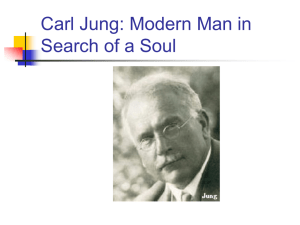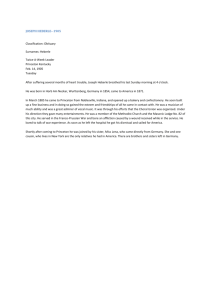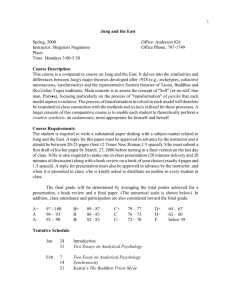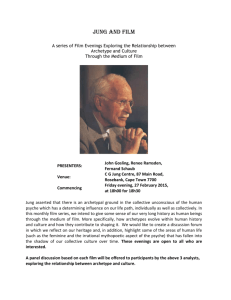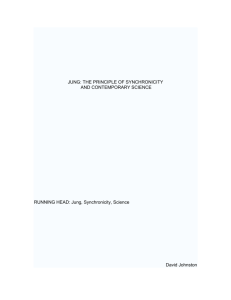CRozuel_April Seminar Notes
advertisement
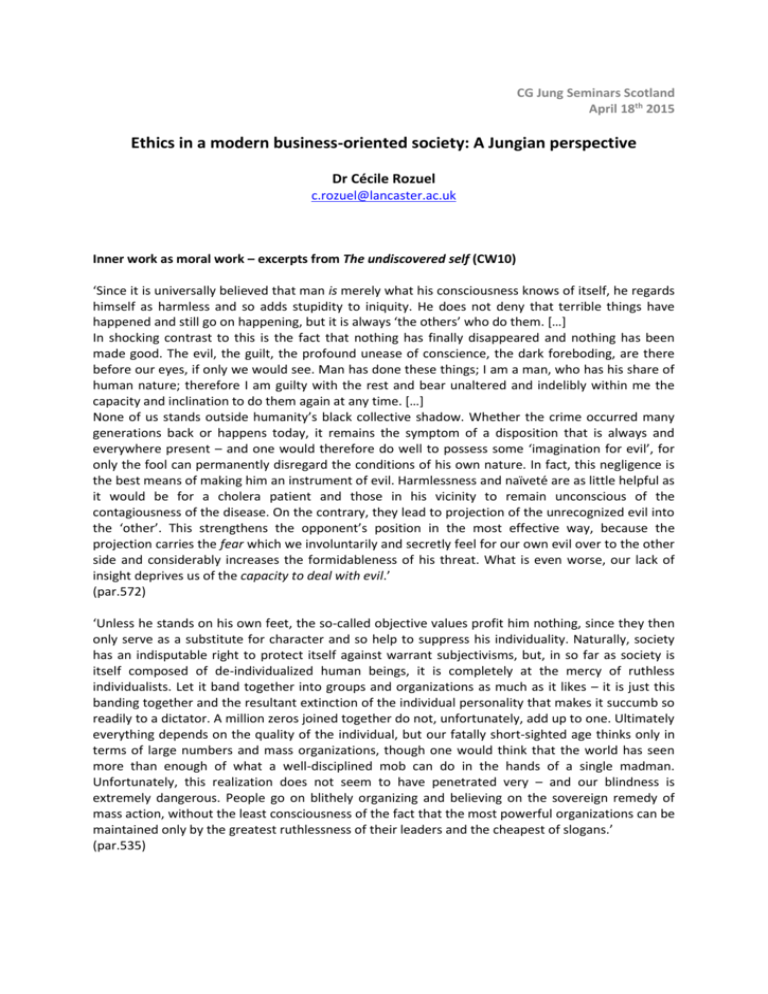
CG Jung Seminars Scotland April 18th 2015 Ethics in a modern business-oriented society: A Jungian perspective Dr Cécile Rozuel c.rozuel@lancaster.ac.uk Inner work as moral work – excerpts from The undiscovered self (CW10) ‘Since it is universally believed that man is merely what his consciousness knows of itself, he regards himself as harmless and so adds stupidity to iniquity. He does not deny that terrible things have happened and still go on happening, but it is always ‘the others’ who do them. […] In shocking contrast to this is the fact that nothing has finally disappeared and nothing has been made good. The evil, the guilt, the profound unease of conscience, the dark foreboding, are there before our eyes, if only we would see. Man has done these things; I am a man, who has his share of human nature; therefore I am guilty with the rest and bear unaltered and indelibly within me the capacity and inclination to do them again at any time. […] None of us stands outside humanity’s black collective shadow. Whether the crime occurred many generations back or happens today, it remains the symptom of a disposition that is always and everywhere present – and one would therefore do well to possess some ‘imagination for evil’, for only the fool can permanently disregard the conditions of his own nature. In fact, this negligence is the best means of making him an instrument of evil. Harmlessness and naïveté are as little helpful as it would be for a cholera patient and those in his vicinity to remain unconscious of the contagiousness of the disease. On the contrary, they lead to projection of the unrecognized evil into the ‘other’. This strengthens the opponent’s position in the most effective way, because the projection carries the fear which we involuntarily and secretly feel for our own evil over to the other side and considerably increases the formidableness of his threat. What is even worse, our lack of insight deprives us of the capacity to deal with evil.’ (par.572) ‘Unless he stands on his own feet, the so-called objective values profit him nothing, since they then only serve as a substitute for character and so help to suppress his individuality. Naturally, society has an indisputable right to protect itself against warrant subjectivisms, but, in so far as society is itself composed of de-individualized human beings, it is completely at the mercy of ruthless individualists. Let it band together into groups and organizations as much as it likes – it is just this banding together and the resultant extinction of the individual personality that makes it succumb so readily to a dictator. A million zeros joined together do not, unfortunately, add up to one. Ultimately everything depends on the quality of the individual, but our fatally short-sighted age thinks only in terms of large numbers and mass organizations, though one would think that the world has seen more than enough of what a well-disciplined mob can do in the hands of a single madman. Unfortunately, this realization does not seem to have penetrated very – and our blindness is extremely dangerous. People go on blithely organizing and believing on the sovereign remedy of mass action, without the least consciousness of the fact that the most powerful organizations can be maintained only by the greatest ruthlessness of their leaders and the cheapest of slogans.’ (par.535) References and suggested readings Bowles, M.L. (1991). The organization shadow. Organization Studies, 12, 387-404. Colby, A. and Damon, W. (1992). Some do care: Contemporary lives of moral commitment. New York, NY: The Free Press/Macmillan. Denhardt, R.B. (1981). In the shadow of organization. Lawrence, KS: University Press of Kansas. Hillman, J. (1995). Kinds of Power. New York, NY: Currency Book/Doubleday. Hillman, J. (1996). The Soul’s Code. New York, NY: Grand Central Publishings. Johnson, R.A. (1991). Owning your own shadow. New York, NY: HarperOne/HarperCollins. Jung, C.G. (1957). The undiscovered self. In: (1970) CW10 - Civilization in transition (2nd ed). Princeton, NJ: Princeton University Press Jung, C.G. (1958). A psychological view of conscience. In: (1970) CW10 - Civilization in transition (2nd ed). Princeton, NJ: Princeton University Press. Jung, C.G. (1963/1995). Memories, dreams, reflections, London: Fontana Press/HarperCollins. Jung, C.G. (1966). Two essays on analytical psychology (2nd ed.): Collected works Vol.7. Princeton, NJ: Princeton University Press. Jung, C.G. (1969). Aion (2nd ed.): Collected works Vol.9, part 2. Princeton, NJ: Princeton University Press. Ketola, T. (2008). From psychopaths to responsible corporations: Waking up the inner sleeping beauty of companies. New York, NY: Nova Science. Mattoon, M.A. (2005). Jung and the human psyche. Hove: Routledge. Moore, T. (1992). Care of the Soul. London: Piatkus. Neumann, E. (1969/1990). Depth Psychology and a New Ethic. Boston, MA: Shambhala. Robinson, D.W. (2005). Conscience and Jung's moral vision. Mahwah, NJ: Paulist Press. Rozuel, C. (2010). Moral tension in the psyche: A Jungian interpretation of managers’ moral experiences. Electronic Journal of Business Ethics and Organization Studies, 15(1), 36-43. Rozuel, C. and Kakabadse, N. (2010). Ethics, spirituality and self: Managerial perspective and leadership implications. Business Ethics: A European Review, 19(4), 423-436. Rozuel, C. (2011). The moral threat of compartmentalization: Self, roles and responsibility. Journal of Business Ethics, 102(4), 685-697. Rozuel, C. (2012). Active imagination and moral imagination: Searching in the depths of the psyche. Journal of Management Development, 31(5), 488-501 Rozuel, C. (2013). Daimon and Psyche: Ethical reflections on a numinous marriage. International Journal of Jungian Studies, 5(3), 211-225. Rozuel, C. (2013). Exemplarity as Commitment to the Self: Insights from Spiritual Healers. Research in Ethical Issues in Organizations Vol.9 ‘Moral Saints and moral exemplars’ (pp.117-151). Rozuel, C. (2014). Calling to the Anima Mundi: On restoring soul within organisations. Journal of Management, Spirituality and Religion, 11(2), 123-142. Stein, M. and Hollwitz, J. (eds) (1992). Psyche at work. Wilmette, IL: Chiron Publications.

